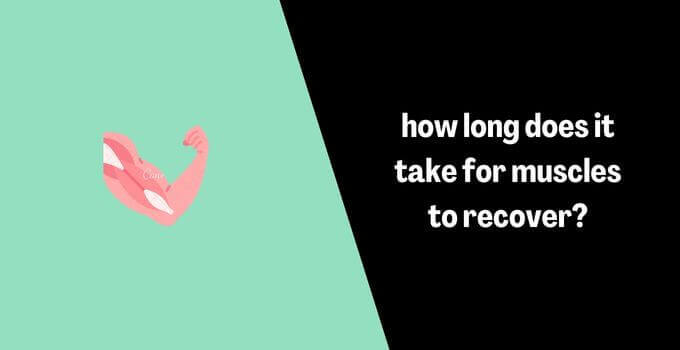As a nutritionist, I often get asked the question: “How long does it take for muscles to recover?”. It’s an understandable query – when you work out hard, you want your body to bounce back as quickly as possible so that you can hit the gym again and keep progressing. Fortunately, there is some good news on this front; muscle recovery can be fast if done correctly.
In this article we’ll explore what factors influence how long it takes for muscles to recover and provide some tips about how to speed up the process. We’ll also look at situations in which extra caution should be taken before getting back into intense physical activity.
Muscle Recovery Time By Age
Muscle recovery is like a marathon – it’s something that requires dedication and patience. Every body recovers differently, but understanding how age affects muscle repair time can give us an idea of what to expect when striving for optimal muscle rebuilding.
When we are younger, our bodies have the ability to repair and rebuild faster than they do as we grow older. This doesn’t mean that muscles won’t recover at any age, only that those in their teenage years or early twenties will generally experience quicker muscle repair time compared to someone who’s closer to middle-age. For example, if you strain your arm while doing some heavy lifting, a teenager may take up to four days before feeling fully recovered whereas an adult may require up to seven days for full recovery.
How Long Should I Rest My Muscles After A Workout?
It is important to understand the importance of rest and recovery after exercise in order for your muscles to rebuild and become stronger. Muscle recovery time varies depending on your age.
Generally speaking, most people need a minimum of 48 hours before they can return to their original workout routine. This gives the body enough time to properly recover from any physical activity performed during the previous session. During this period, muscle fibers will be repaired, glycogen stores replenished and hormones released which aid in muscle growth and repair.
To maximize muscular gains, try giving yourself up to 72 hours between sessions if possible. Studies have shown that taking longer breaks allows for better overall performance when returning into an exercise program as well as reducing the risk of injury due to overtraining or fatigue. Remember: proper rest and recovery times contribute greatly towards achieving optimal results from any fitness regime!
What Muscle Takes Long To Heal And What Muscle Heals Fast?
Muscle injuries can be quite debilitating; they’re also very common in athletes and gym goers alike. Depending on the severity of the injury, it can take anywhere from a few days to several weeks for the muscles to fully recover. Factors like age, fitness level, type of activity performed and intensity levels can also play a role in how long it takes for a muscle to heal.
The speed at which our bodies regenerate depends largely on what kind of damage has been done. For example, smaller tears in the muscle fibers may only require two or three days rest before being able to resume activities again – whereas more significant traumas such as bone fractures may need much longer periods of healing time.
Additionally, muscle repair processes are heavily reliant on good nutrition with adequate protein intake helping promote faster recovery times by providing essential building blocks for cells needed during tissue regeneration. With this knowledge in hand, we now have the tools necessary to best support our bodies through any injury or strain – allowing us to reach peak performance once again!
Causes Of Poor Muscle Recovery
Poor muscle recovery often results from insufficient rest between workouts, inadequate nutrition or hydration, overtraining, incorrect form when lifting weights or doing exercises, and even age-related issues such as stiff joints and tendons.
All these factors can lead to increased levels of muscle fatigue and soreness which in turn impacts how quickly our muscles heal. To prevent this from happening, we need to make sure that we get plenty of rest days between sessions and always use correct form when exercising.
Additionally, ensuring that we consume enough water throughout the day and get adequate amounts of protein will help us maintain healthy energy levels for working out. As we age, flexibility also becomes an important factor in reducing the risk of strains while still challenging ourselves with new movements during exercise routines.
By paying attention to all these details – rest periods, proper technique, nutrition and hydration – we can ensure effective muscle recovery after each workout session without compromising on the intensity level or performance. With the right approach towards training regimens, everyone can have healthier muscles ready for their next challenge!
Conclusion
To wrap up, muscle recovery is essential for any fitness goal. No matter your age or level of physical activity, it’s important to ensure that you are taking the necessary steps to help your muscles heal properly and effectively after a workout. Taking time to rest in between workouts gives your body the opportunity to rebuild itself so that you’re ready for more intense training sessions as well as preventing injury.
Finally, poor muscle recovery could be caused by various factors including nutrient deficiencies, overtraining, dehydration, lack of sleep and stress levels. Taking care of yourself both inside and out is key when it comes to keeping your body at its optimal performance level – fuelling it with nutritious foods, staying hydrated throughout the day and getting enough quality sleep every night should all factor into creating an effective muscle recovery process!
Affiliate Disclosure: Some of the links in this post are affiliate links, which means I may earn a small commission if you make a purchase through those links. This comes at no extra cost to you. Thank you for your support!

